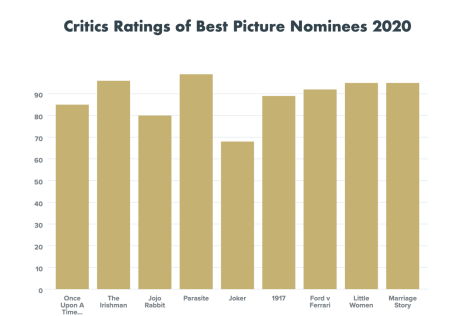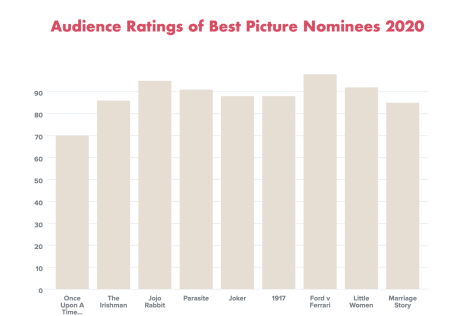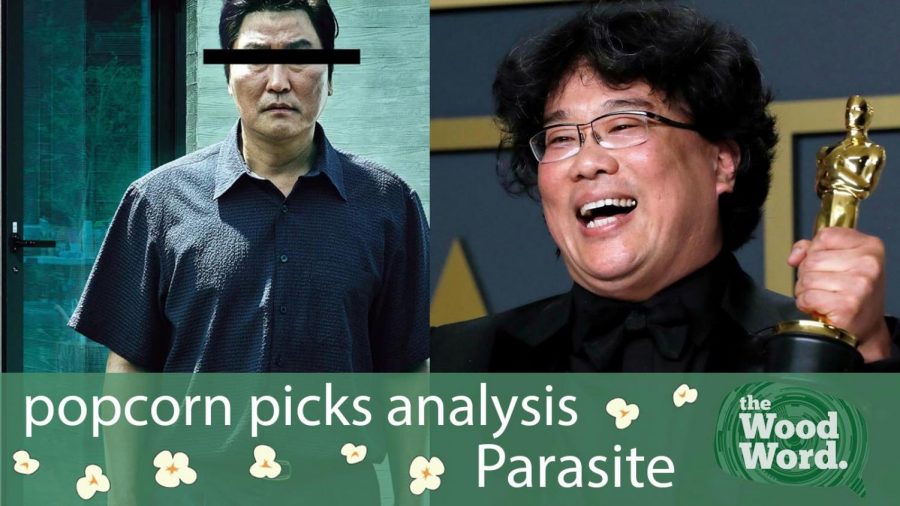Popcorn Picks Analysis: Does Bong Joon-ho’s “Parasite” deserve Best Picture?
March 25, 2020
Every year, the competition at the Academy Awards is brutal. This year was just as ruthless, if not more than previous years.
Last month, “Parasite” surprised the world at the 92nd Annual Ceremony and won three awards in addition to becoming the first foreign film to be given the Academy’s prestigious honor of Best Picture.
The film received the award over eight other nominees, such as the war-time epic “1917,” comedic satire “Jojo Rabbit” and the dramatic period piece “Once Upon A Time… In Hollywood.”
Now that we’ve had some time to settle in with the winners, does Bong Joon-ho’s thriller deserve the honor? Opinions are mixed.
All nine of the nominees for the Academy’s highest honor thoroughly deserved their nominations, in one way or another, but they all still had their faults.


“Ford V Ferrari”
“Ford V Ferrari” is inspired by the events of the 1966 “24 Hours of Le Mans,” a prominent automobile race. The film anecdotes the relationship between British race car driver Ken Miles and automotive prodigy Carroll Shelby, portrayed by Christian Bale and Matt Damon respectively, as they develop the legendary Ford GT40 racing car. Other than stark praise for Bale and Damon’s performances, critics have expressed negative emotions towards the screenplay stating that it occasionally makes the characters unrelatable and shallow.
“The Irishman”
Martin Scorcese’s latest crime epic, “The Irishman,” chronicles the life of truck driver turned hitman Frank Sheeran, known by his associates as “The Irishman.” An adaptation of Charles Brandt’s 2004 novel “I Heard You Paint Houses,” the film was produced as a passion project by Scorcese and actor Robert DeNiro over the past decade. With a star-studded cast including but not limited to Robert DeNiro, Al Pacino, Joe Pesci and Ray Romano, many are celebrating the film for its performances, score and editing by Scorcese’s long time editor Thelma Schoonmaker.
Audiences and critics are split down the middle though, with some enjoying and others scorning, particularly regarding the expensive de-aging CGI technology used on DeNiro and company. In contempt of the meticulous amount of detail stuffed into the nearly four-hour runtime, Glenn Zeitz, an old friend of Sheeran’s in real life who has acted as his posthumous lawyer, added some fuel to the fire by discrediting the authenticity of DeNiro’s portrayal.
“Jojo Rabbit”
Centered around a satirical take on Nazism, “Jojo Rabbit” follows a 10-year-old boy named Jojo Betzler who, alongside his imaginary friend Adolf, questions his allegiance to Nazi party amid its downfall nearing the end of World War II. Roman Griffin Davis, who made his acting debut as Betzler, is the head of an ensemble cast comprised of Scarlett Johansson, Rebel Wilson and Taika Waititi, who also directed and wrote the acclaimed dramatic comedy.
Despite the praise, which even includes the film’s addition to the curriculum at the University of Southern California, there has been vast criticism of the satire. One such critic is Eric Kohn of Indiewire, who describes “Rabbit” as lingering “in a charming muddle of good vibes without really confronting their implications.” Waititi has responded to the criticism, declaring how there might have been less backlash if more of the general public knew he was Jewish.
“Joker”
Based on the infamous Batman villain, “Joker” is unlike any film set in the DC universe thus far in the best way possible. Starring Joaquin Phoenix as Arthur Fleck, an unsuccessful standup comic, the film has critics and audiences praising its cinematography, ominous tone and depiction of mental illness.
Not all critics are fans though, such as Dana Stevens of Slate who describes the film as being “…predictable, clichéd, deeply derivative of other, better movies and overwritten to the point of self-parody.” The psychological thriller also had a fair share of controversy surrounding its release not only due to tension behind the scenes during production, but additionally in part of concerns of violent real-world responses.
“Little Women”
Greta Gerwig’s “Little Women,” the latest adaptation of Louisa May Alcott’s famous novel, is being lauded as the best one yet by audiences and critics alike. The film narrates the transition of the March sisters, portrayed by Saoirse Ronan, Emma Watson, Florence Pugh and Eliza Scanlen, from childhood to womanhood.
Most critics are fans, with numerous praising Ronan and Pugh’s performances alongside the costume design, while some consider it to be too full of itself and has a complex plot structure. Bob Odenkirk, who portrays Father March in the coming-of-age tale, assumes Academy voters purposefully overlooked Gerwig’s adaptation on account of the source material being a “classic.” The film does not let the audience entirely escape from reality though, as several plot points are involuntarily similar to the effects of COVID-19.
“Marriage Story”
Observing the separation and divorce of a couple, “Marriage Story” contemplates the aspirations and struggles of two individuals, portrayed by Adam Driver and Scarlett Johansson. The film has gained “universal acclaim” on Metacritic, primarily for Driver and Johansson’s performances in addition to Laura Dern’s Academy Award winning portrayal of lawyer Nora Fanshaw. While the screenplay from director Noah Baumbach has received modest praise as well, it has also been a victim of controversy as a result of how the writer used his real-life divorce from actress Jennifer Jason Leigh as inspiration.
“1917”
Set during World War I, “1917” tells the tale of two soldiers who are sent on a near-impossible mission across Northern France to prevent the loss of 1,600 men. Distinct praise of the film has been towards the score and editing, with many applauding editor Lee Smith on successfully putting together a motion picture which appears to be a single, uninterrupted shot. The cinematography has also been celebrated, with Clayton David of Award Circuit naming the latter the best of the year and the decade. Even though these elements undoubtedly deserve recognition, some critics devalued their uniqueness in response to the usage of similar techniques by an abundance of other films.
“Once Upon A Time… In Hollywood”
Director Quentin Tarantino’s ninth and penultimate production, “Once Upon A Time… In Hollywood,” is an alternative narrative about the Manson Family and Tate-LaBianca murders. Featuring Leonardo DiCaprio and Brad Pitt as Hollywood actor Rick Dalton and stunt double Cliff Booth respectively, the film is a pure homage to the golden age of Hollywood, as evident by the production design, soundtrack and a plethora of other values.
However, not all talk of the picture is acclaim as many have scrutinized the pacing and runtime. Regardless of what people thought of the film, Tarantino already has plans to expand the film’s universe. At a special screening of the award-winning drama in January, Tarantino shared his vision to release a four-hour cut of “Once Upon A Time… In Hollywood” in the next year. In an interview with Deadline, the director also revealed how he has written five half-hour episodes of “Bounty Law,” the fictional television series that appears within the film and plans to direct them in the coming years. Although, with his reputation for announcing unfinished ideas, don’t count on either one to come anytime soon.
“Parasite”
Last but not least is Bong Joon-ho’s “Parasite,” which depicts a social commentary on class structure in South Korea through two distinct families – the Kims and the Parks.
Since the film premiered last year at the Cannes Film Festival, where it became the first South Korean film to win the festival’s highest prize known as the Palme d’Or, it has gotten universal acclaim from critics and fans worldwide.
Mr. Bong’s Filmography
Although this may be the first film many individuals watch from the director, “Parasite” is far from Mr. Bong’s first foray into filmmaking.
Over the past two decades, the Korean auteur has directed and co-written seven films, including but not limited to his debut “Barking Dogs Never Bite” in 2000, “The Host” in 2006 and his first English-language film “Snowpiercer” in 2013.
Before releasing “Parasite,” Mr. Bong released “Okja” exclusively on Netflix in 2017. While the film generally received positive reviews, it was surrounded in controversy when it premiered at Cannes due to the validity of the streaming service within cinema.
All in all, the director seems to return to the same motifs throughout his filmography. Some of these include black humor, economic divide and sudden mood shifts, which all appear in the latest Best Picture winner.
Controversy Surrounding “Parasite”
Despite its critical acclaim worldwide, “Parasite” has also received a decent amount of scrutiny.
The majority of the criticism directed at Mr. Bong’s latest film comes from the claims of PL Thenappan, an Indian film producer. Thenappan believes that the 1999 Tamil romantic comedy “Minsara Kanna,” which he produced, inspired Bong Joon-ho’s award-winning film.
The two films feature a myriad of similarities that are too considerable to neglect, such as having premises that are nearly identical to one another.
In regards to the parallelism between the two, Thenappan is considering filing a case against Mr. Bong and others involved with the production of “Parasite.”
These accusations, which essentially accuse Mr. Bong of plagiarizing Thenappan’s work, have been largely overlooked in favor of the extensive amount of positive press regarding the film.
Praise for “Parasite”
In the month since winning big at the Academy Awards, the film has flourished in praise on an international scale. In addition to winning Best Foreign Film at the 45th César Awards, the French equivalent to the Academy Awards, Mr. Bong’s latest is also set to release its storyboards as a graphic novel and made over $50 million domestically, partly attributable to a one-week IMAX remaster.
“Parasite” has also made waves in the culinary scene with its take of the noodle dish jjapaguri or “ram-don.” Consisting of two kinds of instant noodles called Chapaghetti and Neoguri and topped off with a cut of sirloin steak, the meal was available in New York City restaurants for anywhere between $13 and $25.
The traditional form of the dish without the steak has boomed in popularity with the current outbreak of COVID-19 worldwide, quickly becoming an ideal and inexpensive meal during these troublesome times.
The surge in recognition may have furthermore influenced the possible casting of Mark Ruffalo and Tilda Swinton in HBO’s limited series adaptation of the film, which is currently in the early stages of pre-production.
People have viewed the potential casting in a controversial light, with some fearing it may be the first sign of how Hollywood plans to white-wash the South Korean film despite the involvement of Mr. Bong in its production.
As a direct result of its success, “Parasite” has exposed the hardships and class strife that the poor in South Korea endure daily.
On the other hand, the film has indirectly presented how South Korean cinema has the potential for international appeal and made its neighboring nation of Japan’s lack of cultural influence abroad increasingly cognizant.
Final Thoughts
In conclusion, does “Parasite” deserve the honor of Best Picture? It’s still hard to say.
The thriller is the third film in history after 1945’s “The Last Weekend” and 1955’s “Marty” to win both the Academy’s highest honor and the most prestigious award given at Cannes Film Festival. Taking into consideration how the two ceremonies look at the art of cinema in different respects, it is not a surprise that it took 65 years for the two to share a recipient once again.
Based off of the film itself, “Parasite” deserves the honor. It delves into subject matters, including but not limited to social inequality and wealth disparity, which are applicable around the world. From the acting and production design to the score and direction by Mr. Bong, “Parasite” is a masterpiece.
The plagiaristic allegations entirely change the interpretation of the film though, allowing the overwhelming amount of evidence to blind the viewer from Mr. Bong’s intention.
Until the allegations get resolved, it is hard to rightfully say that “Parasite” deserves the honor.
Nevertheless, it is essential quarantine viewing material, along with the rest of the nominees for Best Picture. “Parasite” is available to view using home media today and will be exclusively streaming on Hulu starting Wednesday, April 8.
Until then, check out these other critically acclaimed films from South Korea and those that deserved yet did not receive any nominations at this year’s Academy Awards.
Contact the writer: [email protected]
Twitter: @RAndrusTWW





